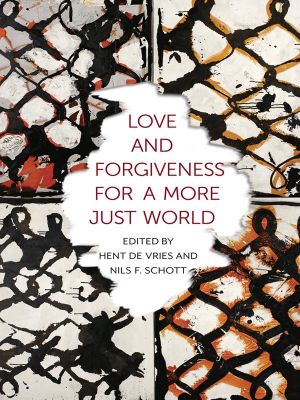Love and Forgiveness for a More Just World

- Authors
- Vries, Hent de
- Publisher
- Columbia University Press
- Tags
- psychology , movements , psychoanalysis , philosophy , ethics and moral philosophy , spirituality , phi005000 , psy026000
- ISBN
- 9780231540124
- Date
- 2015-11-03T00:00:00+00:00
- Size
- 17.25 MB
- Lang
- en
One can love and not forgive, or out of love decide not to forgive. Or one can forgive but not love, or choose to forgive but not love the ones forgiven. Love and forgiveness follow parallel and largely independent paths, a truth we fail to acknowledge when we pressure others to both love and forgive. Though it is hard to imagine a peaceful world without love and forgiveness, individuals in conflict, sparring social and ethnic groups, warring religious communities, and insecure nations often do not need to pursue love and forgiveness to achieve peace of mind and heart. They need to remain attentive and attuned to the needs of others, an alertness that prompts either love or forgiveness to respond. By reorienting our perception of these enduring phenomena, the contributors to this volume inspire new theoretical and practical applications for love and forgiveness in an increasingly globalized and no longer quite secular world. With contributions by the renowned French...
One can love and not forgive or out of love decide not to forgive. Or one can forgive but not love, or choose to forgive but not love the ones forgiven. Love and forgiveness follow parallel and largely independent paths, a truth we fail to acknowledge when we pressure others to both love and forgive. Individuals in conflict, sparring social and ethnic groups, warring religious communities, and insecure nations often do not need to pursue love and forgiveness to achieve peace of mind and heart. They need to remain attentive to the needs of others, an alertness that prompts either love or forgiveness to respond. By reorienting our perception of these enduring phenomena, the contributors to this volume inspire new applications for love and forgiveness in an increasingly globalized and no longer quite secular world. With contributions by the renowned French philosophers Jacques Derrida and Jean–Luc Marion, the poet Haleh Liza Gafori, and scholars of religion (Leora Batnitzky, Nils F. Schott, Hent de Vries), psychoanalysis (Albert Mason, Orna Ophir), Islamic and political philosophy (Sari Nusseibeh), and the Bible and literature (Regina Schwartz), this anthology reconstructs the historical and conceptual lineage of love and forgiveness and their fraught relationship over time. By examining how we have used–and misused–these concepts, the authors advance a better understanding of their ability to unite different individuals and emerging groups around a shared engagement for freedom and equality, peace and solidarity.
One can love and not forgive or out of love decide not to forgive. Or one can forgive but not love, or choose to forgive but not love the ones forgiven. Love and forgiveness follow parallel and largely independent paths, a truth we fail to acknowledge when we pressure others to both love and forgive. Individuals in conflict, sparring social and ethnic groups, warring religious communities, and insecure nations often do not need to pursue love and forgiveness to achieve peace of mind and heart. They need to remain attentive to the needs of others, an alertness that prompts either love or forgiveness to respond.
By reorienting our perception of these enduring phenomena, the contributors to this volume inspire new applications for love and forgiveness in an increasingly globalized and no longer quite secular world. With contributions by the renowned French philosophers Jacques Derrida and Jean-Luc Marion, the poet Haleh Liza Gafori, and scholars of religion (Leora Batnitzky, Nils F. Schott, Hent de Vries), psychoanalysis (Albert Mason, Orna Ophir), Islamic and political philosophy (Sari Nusseibeh), and the Bible and literature (Regina Schwartz), this anthology reconstructs the historical and conceptual lineage of love and forgiveness and their fraught relationship over time. By examining how we have used--and misused--these concepts, the authors advance a better understanding of their ability to unite different individuals and emerging groups around a shared engagement for freedom and equality, peace and solidarity.--Willemien Otten, University of Chicago